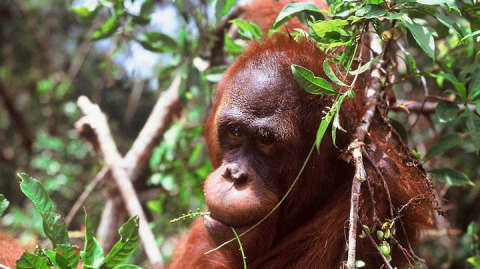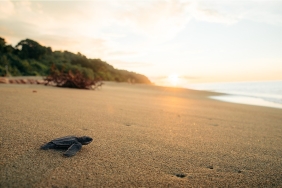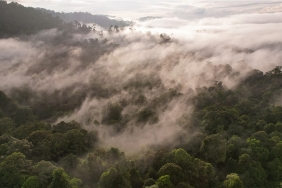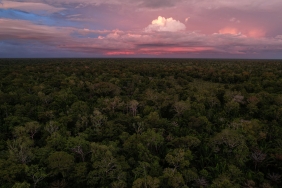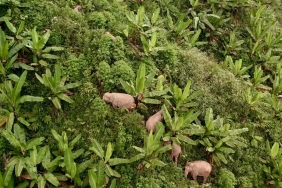THANK YOU ORANGUTAN
It's a sunny day. We walk along the banks of a small river in the swamp forest, walking in silence. These rivers are where we set trawls to catch fish, and the overhanging tree crowns are where orangutans forage for fruits. If we were lucky, today we could meet a shy animal whose existence is already rare in the world. Sure enough, there was an individual orangutan clinging to a mengku tree (Diospyros coriacea), happily eating its fruit without being disturbed by our arrival. Our foreign guest was dumbfounded and smiled happily, seemingly satisfied to be able to see orangutans in their natural habitat.
In the past, orangutans didn't interest me, and I didn't believe Meliau Hamlet was interesting for tourism. Our hamlet is located far from the crowds. The nearest town, Lanjak, is 1.5 hours away by longboat. Not many people come, and we don't often leave the village. Surprisingly, many foreign and domestic guests are willing to come all the way and pay to see orangutans, an animal that is near us on a daily basis.
Kaban Mayas
.
My name is Sodik Asmoro. I live in an Iban Dayak community, in a Betang (long house) in Meliau Hamlet, Melemba Village, a village located in the buffer zone of Danau Sentarum National Park, Kapuas Hulu Regency, West Kalimantan - Indonesia. Behind our Betang, is the tropical forest that provides us with many benefits for living, as well as the habitat of the Bornean orangutan that is the tourist attraction of this area.
We are very fortunate that the hilly forests and swamps in our natural environment provide the perfect habitat for orangutans. The fruit season in Bukit Peninjau is the perfect time for us, the "Kaban Mayas" Tourism Management Group to bring guests. Orangutans consume approximately 60% fruits as their diet, in addition to tubers, leaves and small insects.
"Kaban Mayas" - meaning 'orangutan friends' - started about 10 years ago. We observed orangutan behavior every month for the first year, identified their movements, marked their food trees and began creating walking trails. We also continued to convince villagers that the presence of this species can bring benefits to humans, direct and indirect benefits that have been enjoyed so far.
I was initially skeptical that orangutans were a tourism potential. WWF offered this alternative livelihood in 2008, a tourist activity that would also conserve nature. Apathetic, I considered this a government program that we did not like, until WWF staff were chased out of the village. But they continued to provide us with information about conservation and its benefits for life. Until finally in 2010, we became interested and slowly began to build a tourism program.
This was not an easy matter, because the villagers viewed the forest as their backyard, nothing special. For years, we continued to convince villagers that orangutan tourism could provide economic benefits, from providing accommodation, transportation, food, to becoming local guides. The initially small number of tourists made it increasingly difficult to convince the villagers.
In 2019, more than 400 tourists arrived. Now, Meliau Hamlet residents have felt the economic benefits of orangutan ecotourism. Mrs. Tamin (deceased), one of the Betang's residents, feels lucky that the villagers protect the orangutans, so that life is better. "Protecting orangutans means protecting the forest, so that water sources are preserved," she said at the time.
Our business is not always successful. There are quiet times, when orangutans move to the forest across the lake because the fruit season is bigger there. There is also the fear of poachers coming and capturing our orangutans. We are also afraid that one day a company will come and convert our forest. But the biggest challenge so far has been the Covid-19 pandemic, because we've lost revenue from tourism. There are no tourists coming. Meliau Hamlet is quiet, we are also forced to close ourselves and not accept guests. It's been almost six months since we were isolated.
The ancestors of Dayak Iban
Our trip today was truly satisfying. Both on the longboat ride and on foot, our guests saw at least four orangutans happily feeding. We also enjoyed observing the orangutans, neither party disturbing the other at all. Our guest told us that he would come back with his friends to see the orangutans. He hopes that we will continue to protect the forest and all the animals in it.
I have no doubt that the presence of orangutans has brought many blessings to our village, so we are protecting our customary forest areas and working towards village forest status. Orangutans are the ancestors of the Dayak Iban tribe, whom we respect and cherish.
After the pandemic ends, we will continue our orangutan tourism business. Meliau villagers believe the business will recover soon, and guests will come back. I promise in my heart to preserve and protect orangutans and their habitat. Utilizing natural resources cannot be separated from protecting them. The Dayak Iban tribe has taught for generations that humans should not harm orangutans, let alone kill them.
Thank you Orangutan, you have come as a helper and economic booster for the community. My dream is simple, that Bornean orangutans remain forever. They exist and live together side by side with the Dayak Iban people, taking care of each other.

